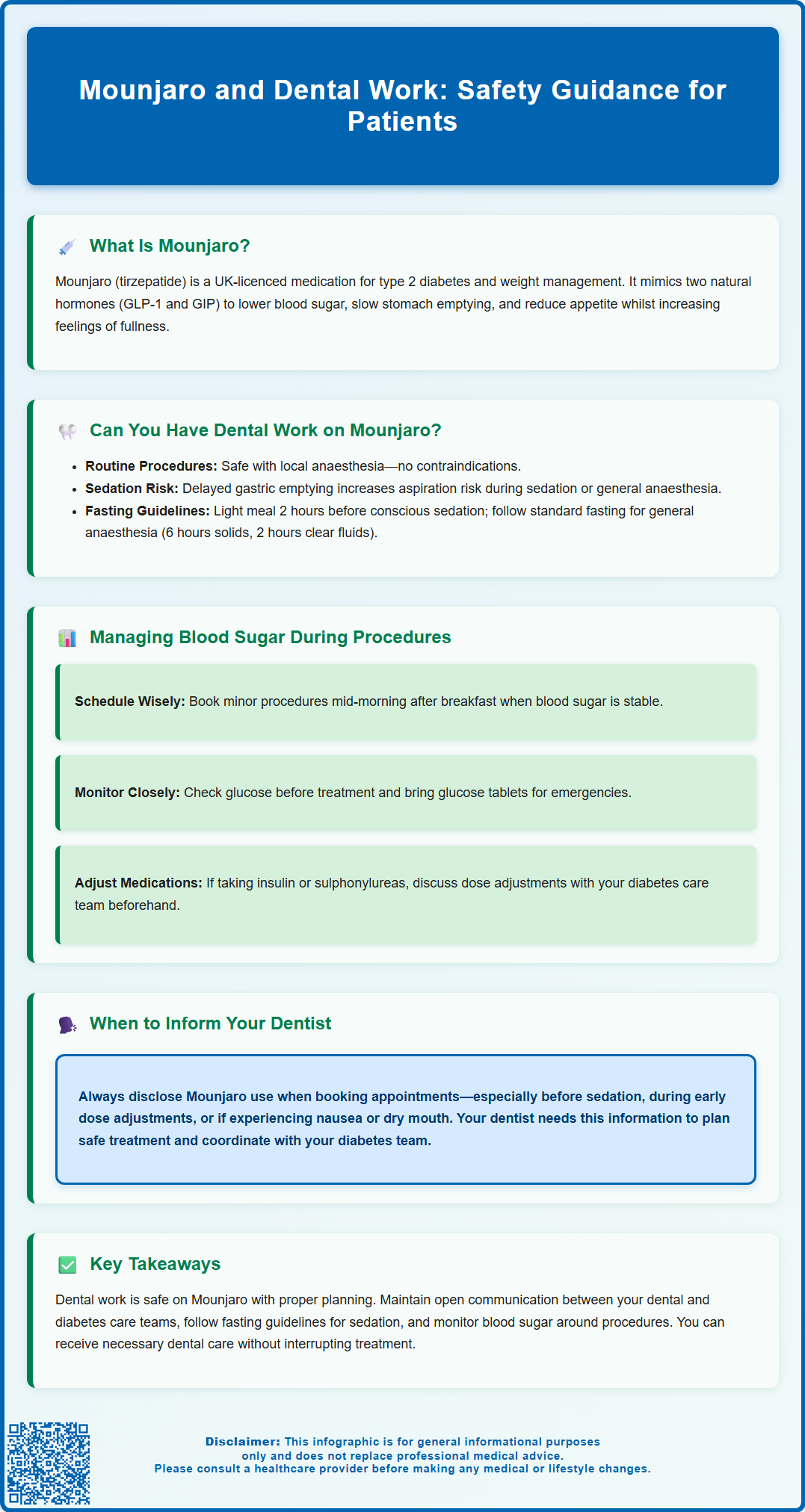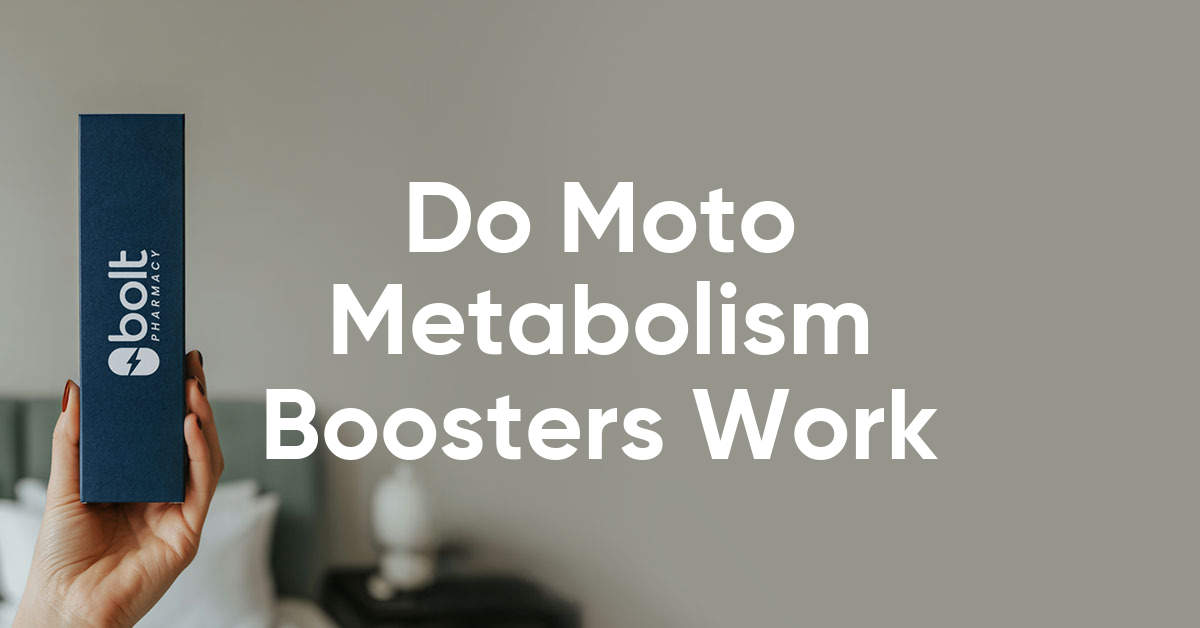Many patients prescribed Mounjaro (tirzepatide) for type 2 diabetes or weight management wonder whether they can safely undergo dental procedures whilst taking this medication. Mounjaro is a dual GIP and GLP-1 receptor agonist that slows gastric emptying and affects blood glucose regulation—factors that may influence dental treatment planning, particularly when sedation or anaesthesia is required. This article examines the relationship between Mounjaro and dental work, exploring safety considerations, blood sugar management during procedures, and when to inform your dental team about your treatment. Understanding these aspects ensures you can maintain both your oral health and diabetes management effectively.
Summary: You can generally have dental work whilst taking Mounjaro, though certain precautions regarding gastric emptying and sedation may be necessary for some procedures.
- Mounjaro (tirzepatide) is a dual GIP and GLP-1 receptor agonist used for type 2 diabetes and weight management that slows gastric emptying.
- Routine dental procedures under local anaesthesia can typically proceed normally without interrupting Mounjaro treatment.
- For procedures requiring sedation or general anaesthesia, inform your dental team about Mounjaro due to aspiration risk from delayed gastric emptying.
- Blood glucose monitoring before and after dental procedures is advisable, particularly for extensive treatment or when fasting is required.
- Always disclose Mounjaro use to your dentist, especially before sedation, oral surgery, or if experiencing gastrointestinal side effects.
Table of Contents
What Is Mounjaro and How Does It Work?
Mounjaro (tirzepatide) is a prescription medicine licensed in the UK for the treatment of type 2 diabetes mellitus. In the UK, tirzepatide is also available under the brand name Zepbound for weight management in adults with obesity or overweight with weight-related health conditions. It belongs to a class of medications that act as dual glucose-dependent insulinotropic polypeptide (GIP) and glucagon-like peptide-1 (GLP-1) receptor agonists.
The drug works by mimicking the action of two naturally occurring incretin hormones in the body. GLP-1 stimulates insulin secretion when blood glucose levels are elevated, suppresses glucagon release (which normally raises blood sugar), slows gastric emptying, and reduces appetite. GIP also enhances insulin secretion and has effects on energy metabolism. Together, these actions help lower blood glucose levels in people with type 2 diabetes and promote weight loss by reducing food intake and increasing feelings of fullness.
Mounjaro is administered as a once-weekly subcutaneous injection, typically in the abdomen, thigh, or upper arm. Treatment usually starts with 2.5 mg once weekly for 4 weeks, then increases gradually to minimise gastrointestinal side effects such as nausea, vomiting, and diarrhoea, which are among the most commonly reported adverse reactions. According to the Medicines and Healthcare products Regulatory Agency (MHRA) Summary of Product Characteristics, tirzepatide has demonstrated significant efficacy in glycaemic control and weight reduction in clinical trials.
Patients prescribed Mounjaro should be aware that, like all medications, it may interact with other treatments and medical procedures. Understanding how Mounjaro works is essential when considering any medical or dental intervention, as its effects on blood sugar, gastric emptying, and overall metabolism may have implications for procedural planning and recovery.
Can You Have Dental Work While Taking Mounjaro?
Yes, you can generally have dental work while taking Mounjaro. There is no official contraindication to routine or complex dental procedures for patients using tirzepatide. However, certain considerations should be taken into account to ensure safe and effective care during dental treatment.
One of the primary concerns relates to gastric emptying. Mounjaro slows the rate at which food and liquids leave the stomach, which can increase the risk of aspiration (inhaling stomach contents into the lungs) if sedation or general anaesthesia is required. For minor dental procedures performed under local anaesthesia, this is typically not a significant issue.
For dental procedures requiring conscious sedation, UK guidance from the Intercollegiate Advisory Committee for Sedation in Dentistry (IACSD) advises that patients should not be starved. You can usually have a light meal about 2 hours before the appointment.
For procedures requiring general anaesthesia or deep sedation, standard fasting guidelines apply (typically 6 hours for solids, 2 hours for clear fluids), unless your anaesthetist advises otherwise. It's particularly important to inform your dental team if:
-
You are in the early stages of Mounjaro dose escalation
-
You are experiencing significant gastrointestinal symptoms like nausea or vomiting
In these situations, your dentist or anaesthetist may recommend deferring elective procedures or implementing additional precautions to manage aspiration risk.
Most patients should continue taking Mounjaro as prescribed during dental treatment. Your dentist and anaesthetist can implement appropriate positioning and airway management strategies to mitigate any risks.
It is important to note that there is no established link between Mounjaro and increased dental complications such as tooth decay, gum disease, or delayed wound healing. Some patients taking medications in this class report dry mouth as a possible side effect, which could potentially affect oral health by reducing saliva's protective effects.
For most patients, routine dental check-ups, cleanings, fillings, and minor procedures can proceed as normal. The key is open communication between you, your dentist, and your diabetes care team.

Managing Blood Sugar Levels During Dental Procedures
Maintaining stable blood glucose levels during dental procedures is an important consideration for anyone with type 2 diabetes, including those taking Mounjaro. While tirzepatide helps regulate blood sugar, the stress of dental treatment, changes in eating patterns, and potential fasting requirements can all affect glycaemic control.
For minor dental procedures such as routine examinations, scale and polish, or simple fillings, blood sugar management is usually straightforward. These appointments are typically brief and do not require fasting, so you can take your Mounjaro as prescribed and eat normally beforehand. It is advisable to schedule dental appointments at a time of day when your blood sugar is typically stable—often mid-morning after breakfast.
For more extensive procedures requiring sedation or general anaesthesia, planning becomes more important:
-
Check your blood glucose before the procedure, especially for extensive treatment or sedation
-
Monitor your blood glucose more frequently in the days leading up to and following the procedure
-
Bring glucose tablets or gel to your appointment in case of hypoglycaemia
-
For conscious sedation, eat a light meal about 2 hours before (do not fast unnecessarily)
-
For general anaesthesia, follow your anaesthetist's fasting instructions
-
Have a plan for resuming normal eating after the procedure, particularly if your mouth is sore or numb
According to NICE guideline NG28 on type 2 diabetes management, patients should be supported to maintain good glycaemic control during any medical or dental intervention. If you experience symptoms of hypoglycaemia (low blood sugar)—such as shakiness, sweating, confusion, or rapid heartbeat—during or after dental treatment, inform your dentist immediately. Although Mounjaro alone does not typically cause hypoglycaemia, the risk increases if you are also taking other diabetes medications such as insulin or sulphonylureas. If you take these medications, discuss potential dose adjustments with your diabetes care team before your dental procedure.
After dental procedures, particularly those involving extractions or oral surgery, you may need to modify your diet temporarily to soft or liquid foods. Ensure these choices still provide adequate nutrition and do not cause significant blood sugar fluctuations. Your diabetes care team can provide tailored advice on managing your diet and medication during recovery.
When to Inform Your Dentist About Mounjaro Treatment
You should always inform your dentist that you are taking Mounjaro at the beginning of any dental appointment, ideally when booking or during your initial consultation. This information is essential for your dental team to provide safe, appropriate care and to plan any necessary precautions.
Key situations when disclosure is particularly important include:
-
Before any procedure requiring sedation or general anaesthesia, due to the delayed gastric emptying associated with tirzepatide
-
If you are in the early stages of dose escalation or experiencing significant gastrointestinal symptoms like nausea, vomiting, or reflux
-
When planning oral surgery, extractions, or dental implants, as these may require fasting or affect your ability to eat normally afterwards
-
If you are experiencing side effects from Mounjaro such as nausea, vomiting, or dry mouth, which may impact your oral health or tolerance of dental procedures
-
When discussing your medical history, as your dentist needs a complete picture of your health conditions and medications
Your dentist should record Mounjaro on your medical history form along with other medications, allergies, and health conditions. This information helps them assess potential risks, plan appropriate treatment, and coordinate care with your GP or diabetes specialist if needed.
You should contact your dentist promptly if you develop:
-
Persistent dry mouth affecting your quality of life or oral health
-
Dental pain or infection, which may affect your blood sugar control
-
Difficulty eating due to dental problems, which could interfere with diabetes management
Similarly, contact your GP or diabetes care team if dental problems are affecting your ability to take Mounjaro as prescribed or maintain stable blood glucose levels. In some cases, temporary adjustment of your diabetes medication may be necessary during dental treatment or recovery.
If you experience any suspected side effects from Mounjaro, report them to the MHRA Yellow Card scheme, which helps monitor the safety of medicines in the UK.
By maintaining open communication between your dental team, diabetes care providers, and yourself, you can ensure that dental work proceeds safely and effectively while continuing your Mounjaro treatment. There is no need to avoid necessary dental care, but proper planning and coordination are essential for optimal outcomes.
Frequently Asked Questions
Do I need to stop taking Mounjaro before dental surgery?
No, you typically do not need to stop Mounjaro before dental surgery. However, inform your dentist and anaesthetist about your treatment, as they may implement additional precautions for procedures requiring sedation or general anaesthesia due to delayed gastric emptying.
Can Mounjaro cause dental problems or tooth decay?
There is no established link between Mounjaro and increased dental complications such as tooth decay or gum disease. Some patients may experience dry mouth as a side effect, which could potentially affect oral health if not managed appropriately.
Should I fast before dental treatment if I take Mounjaro?
For routine dental work under local anaesthesia, fasting is not necessary. For conscious sedation, a light meal about 2 hours before is typically acceptable. For general anaesthesia, follow standard fasting guidelines (usually 6 hours for solids, 2 hours for clear fluids) unless your anaesthetist advises otherwise.
The health-related content published on this site is based on credible scientific sources and is periodically reviewed to ensure accuracy and relevance. Although we aim to reflect the most current medical knowledge, the material is meant for general education and awareness only.
The information on this site is not a substitute for professional medical advice. For any health concerns, please speak with a qualified medical professional. By using this information, you acknowledge responsibility for any decisions made and understand we are not liable for any consequences that may result.
Heading 1
Heading 2
Heading 3
Heading 4
Heading 5
Heading 6
Lorem ipsum dolor sit amet, consectetur adipiscing elit, sed do eiusmod tempor incididunt ut labore et dolore magna aliqua. Ut enim ad minim veniam, quis nostrud exercitation ullamco laboris nisi ut aliquip ex ea commodo consequat. Duis aute irure dolor in reprehenderit in voluptate velit esse cillum dolore eu fugiat nulla pariatur.
Block quote
Ordered list
- Item 1
- Item 2
- Item 3
Unordered list
- Item A
- Item B
- Item C
Bold text
Emphasis
Superscript
Subscript










